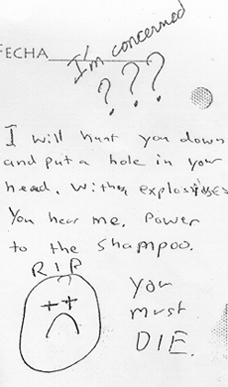




 | 
In the late 1990s Americans witnessed a startling new terror: kids killing
other kids in school. FRONTLINE takes a measure of this national dilemma
through a detailed, intimate journey into the life of one high school shooter,
Kip Kinkel. In May 1998, at the age of 15, Kip shot his father and mother to
death and the next day opened fire on classmates in Springfield, Oregon,
murdering two and injuring 25.
Now 21 years old, Kip is serving a 111 year prison sentence in an Oregon youth correctional facility after pleading guilty to murder. In January 2004 a request for a new trial was filed based on claims that Kip's lawyers failed to properly pursue an insanity defense. A judge is expected to rule on that appeal within the year.
 |  |
| From Kip's Spanish homework pages |  |
FRONTLINE's report, which first aired on Jan. 18, 2000, examines in detail Kip's life. He was a boy from a solid,
middle-class nurturing family who grew up in a good community. Featuring
interviews with Kip's friends, the family's friends--and
drawing on family home movies, excerpts from Kip's writings, his
psychologist's notes, and a harrowing audio tape of his
confession -- this program probes what turned "shy and likeable" Kip into
what police call "a cold-blooded killer."
FRONTLINE investigates the tragedy through multiple viewpoints, and offers an
understanding of Kinkel's story even those most intimately involved in his
life didn't know. School officials and counselors remember Kip as a boyish and
likeable teenager who nobody identified as high risk. His sister
Kristin, like many others in his life, never noticed any warning signs that
might indicate violent--or murderous--behavior. But FRONTLINE traces the quiet
terror and ordinary way in which Kip and his parents lost their way.
The parents struggled with Kip's growing violence and emotional turmoil.
And small, easily unnoticed wounds shaped Kip's interior world: he was the awkward
child in a family that prized athletic prowess, a dyslexic boy in a family of
academic achievers, and a teenager who studied how to make bombs, set off small
explosives and was increasingly fascinated with firearms.
In the events leading up to the tragic day,
FRONTLINE examines the adolescent
logic that lead Kip inexorably to the killings. "I am
evil and want to kill and give pain without cost and there is no such thing.
In the end, I hate myself for what I have become," Kip wrote in his
journal.
In November 1999, a year and a half after the murders and shootings, Kip
Kinkel was sentenced to over 111 years in prison for the crimes, with no chance of
parole. It was a sentence arrived at after testimony by psychiatrists on
whether Kip was mentally ill; the statements of his victims and their
families; and the judge's ruling which took into account a change in
Oregon's constitution which now emphasizes the protection of society and
personal accountability over possible reformation or rehabilitation.
Reflecting on the tragedy, Kip's sister Kristin says people want an easy
answer. "They want assurance that this is never going to happen to them. To
know that if you do all the right things, this isn't going to happen to your
child. I wish I could tell you that it won't.
 |